高中英语外研版 必修三 module 3 The Violence of Nature Reading and vocabulary课件(54张ppt)
文档属性
| 名称 | 高中英语外研版 必修三 module 3 The Violence of Nature Reading and vocabulary课件(54张ppt) |

|
|
| 格式 | ppt | ||
| 文件大小 | 1.0MB | ||
| 资源类型 | 教案 | ||
| 版本资源 | 外研版 | ||
| 科目 | 英语 | ||
| 更新时间 | 2021-02-25 19:48:43 | ||
图片预览

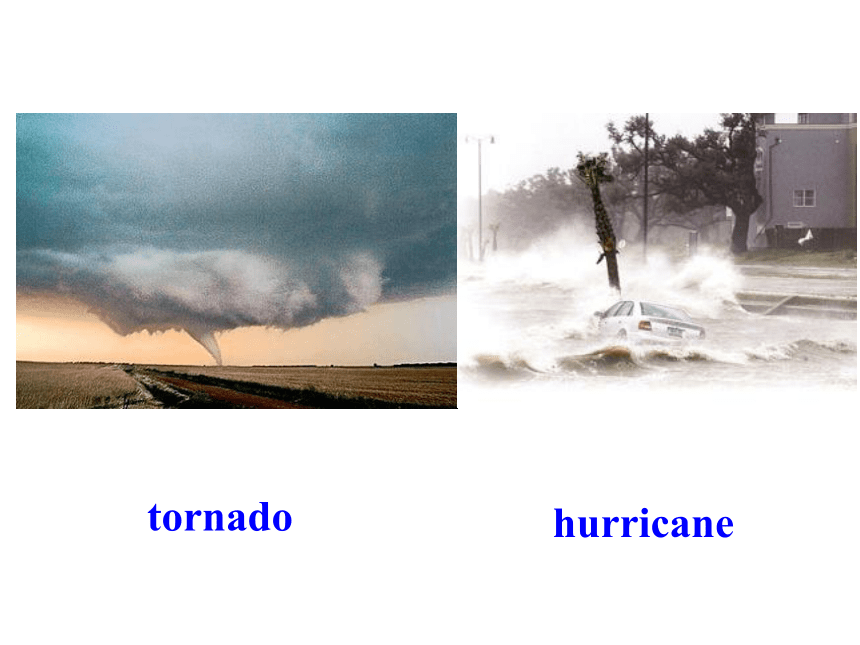
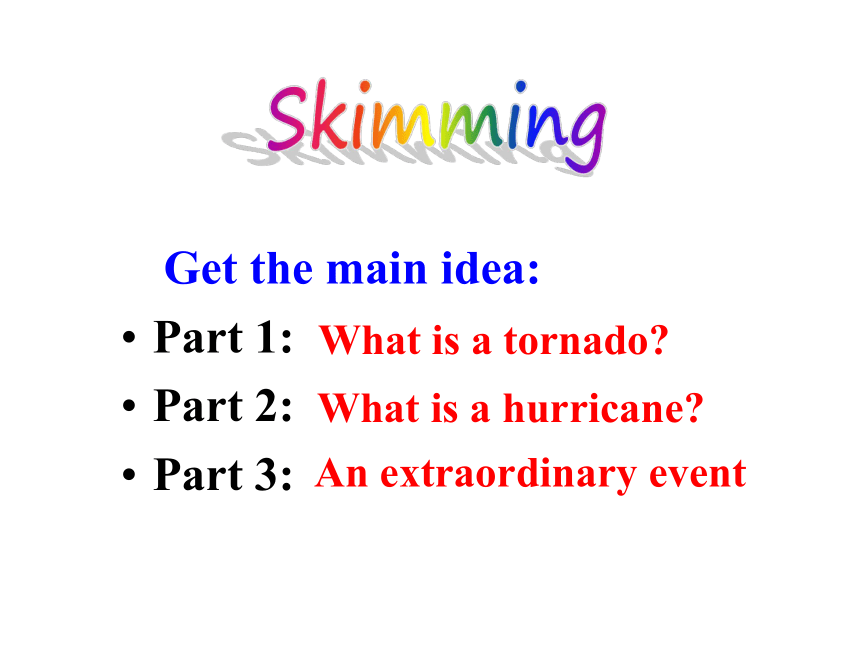

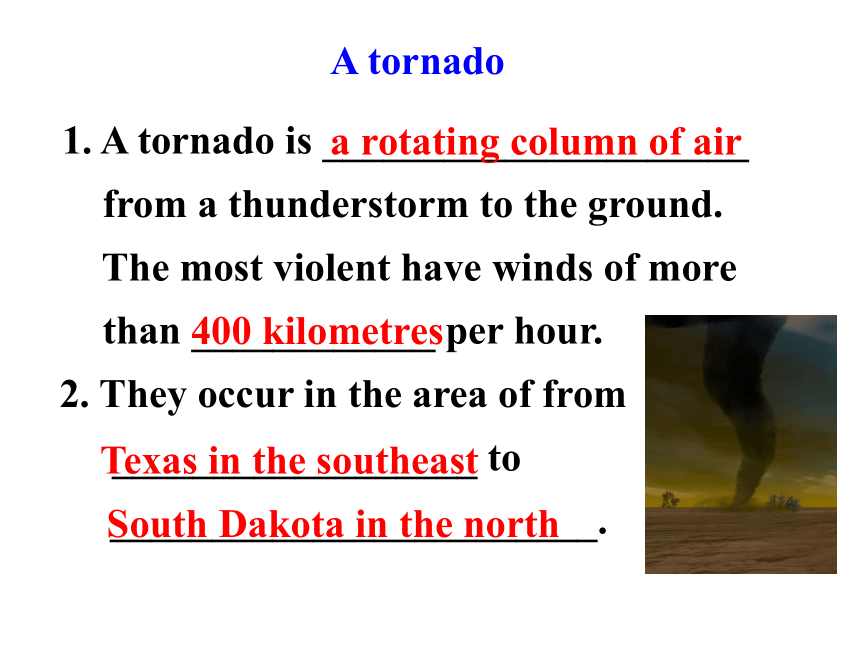
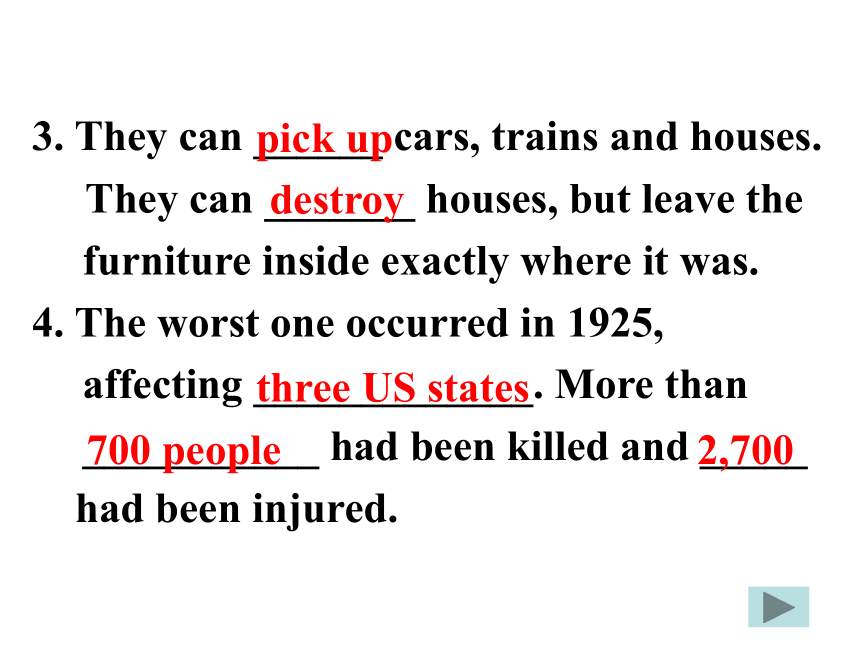
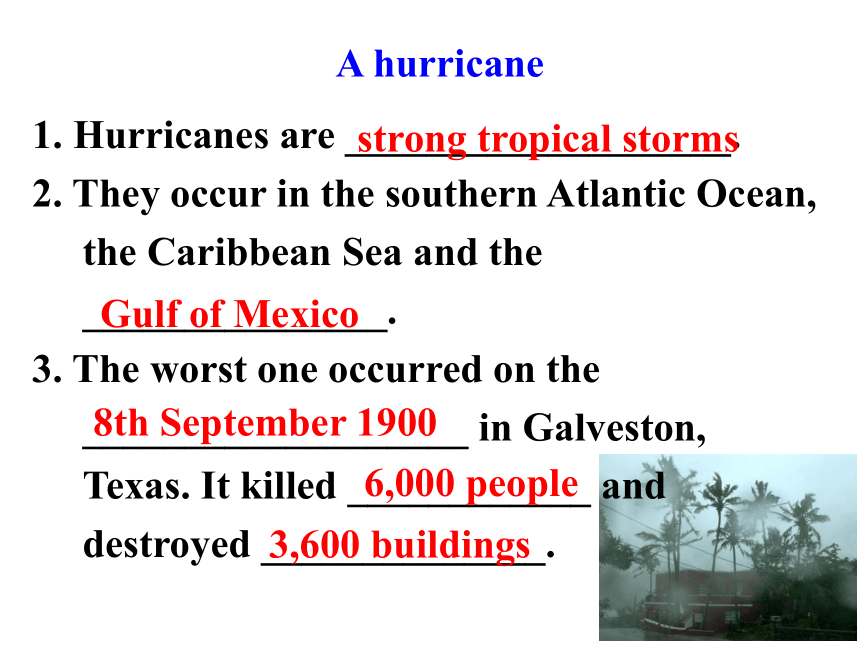
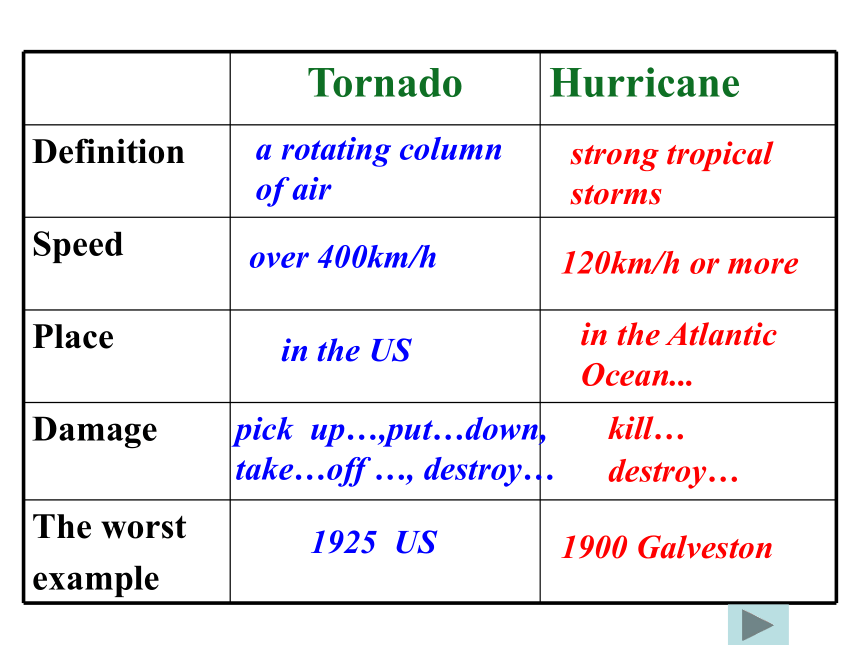

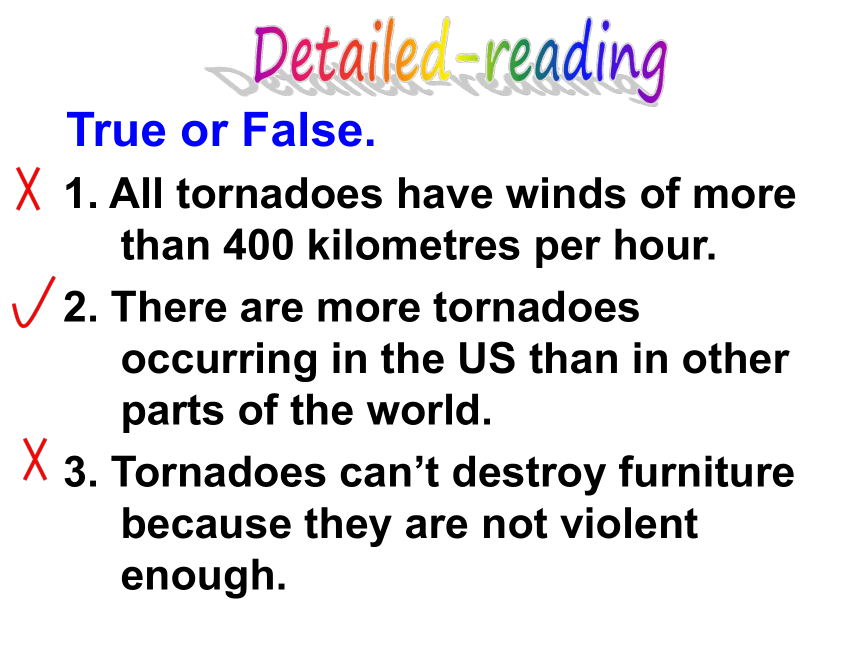

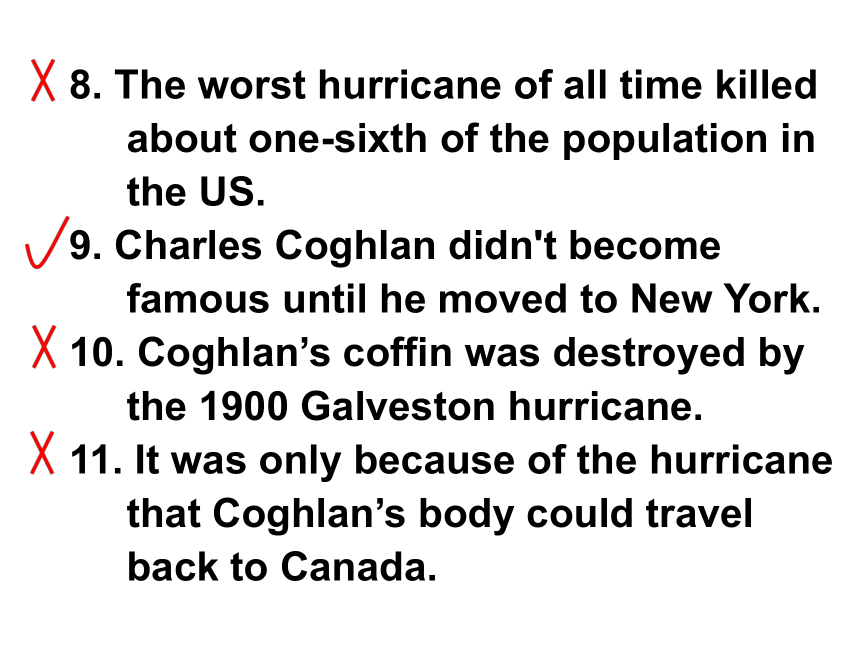
文档简介
tornado
hurricane
Get the main idea:
Part 1:
Part 2:
Part 3:
What is a tornado?
What is a hurricane?
An extraordinary event
A tornado
A hurricane
An extraordinary event
Read the three passages quickly
and fill in the blanks.
A tornado
1. A tornado is _____________________
from a thunderstorm to the ground.
The most violent have winds of more
than ____________ per hour.
2. They occur in the area of from
__________________ to
________________________.
a rotating column of air
400 kilometres
Texas in the southeast
South Dakota in the north
3. They can ______ cars, trains and houses.
They can _______ houses, but leave the furniture inside exactly where it was.
4. The worst one occurred in 1925, affecting _____________. More than ___________ had been killed and _____
had been injured.
pick up
destroy
three US states
700 people
2,700
A hurricane
1. Hurricanes are ___________________.
2. They occur in the southern Atlantic Ocean, the Caribbean Sea and the _______________.
3. The worst one occurred on the ___________________ in Galveston, Texas. It killed ____________ and destroyed ______________.
strong tropical storms
Gulf of Mexico
8th September 1900
6,000 people
3,600 buildings
Tornado
Hurricane
Definition
Speed
Place
Damage
The worst
example
a rotating column of air
strong tropical storms
over 400km/h
120km/h or more
in the US
in the Atlantic Ocean...
pick up…,put…down,
take…off …, destroy…
kill…
destroy…
1925 US
1900 Galveston
Coghlan went to live in Canada. →He
then moved to ____________ →Galveston→(his coffin) → ___________________ in Canada.
New York
Prince Edward Island
An extraordinary event
True or False.
1. All tornadoes have winds of more than 400 kilometres per hour.
2. There are more tornadoes occurring in the US than in other parts of the world.
3. Tornadoes can’t destroy furniture because they are not violent enough.
4. In the US, there are usually about 80 people killed in tornadoes every year.
5. The worst tornado in history killed at least 700 people.
6. Every year there are six Atlantic
hurricanes.
7. Both the worst tornado and the
worst hurricane occurred in the
US.
8. The worst hurricane of all time killed about one-sixth of the population in the US.
9. Charles Coghlan didn't become famous until he moved to New York.
10. Coghlan’s coffin was destroyed by the 1900 Galveston hurricane.
11. It was only because of the hurricane that Coghlan’s body could travel back to Canada.
1. you an see this on an animal.
2. describe the hottest parts of
the earth, north and south of
the equator.
3. a terrible event
4. you can see these on a bird
5. to place in the ground or tomb
6. to happen
bury
disaster
feathers
tropical
occur
fur
Match the words with their definitions.
1. a rotating column of air 一股旋转的气柱
rotate vi.&vt. 旋转;自转
The earth rotates from west to east.
地球从西向东旋转。
Farmers rotate crops in their fields.
农民在耕地上轮栽农作物。
Language study
2. Almost all of them occur in the US,…
几乎所有的龙卷风都发生在美国。
occur vi.发生,出现;(某想法)出现在脑中,被想到。常用于sth. occurs to sb.和it occurs to sb. that ... 结构。如:
That’s the place where the accident occurred.
那就是肇事地点。
A good idea occurred to me when I came into the classroom.
当我进到教室里的时候,我突然想起了一个好主意。
It occurred to me that today is my mother’s birthday.
我忽然想起今天是母亲的生日。
【链接】
occurrence n. 发生的事情,存在的事物;发生,出现
【辨析】 occur, happen, take place
三者都可表示“发生”,都属于不及物动词(短语)。happen表示“发生”时,主语一般为“事”;当主语为“人”时,意为“碰巧”;occur表示“偶然发生”时可与happen互换,但它还可表示“按计划发生”。当happen与occur后接to sb. / sth.时,含义不同:happen to sb. / sth. 多指不好的事情发生在某人 / 物身上,occur to sb. / sth. 指某事、想法、观念等出现在人的头脑中;
take place 常表示计划、安排之内的“发生、进行”,偶尔也可表示计划之外的“发生”,但其后面一般不接to sb. / sth.结构。
【例句】
A big earthquake occurred / happened in that area last month.
上个月那个地方发生了大地震。
I happen to know the answer to your question.
我碰巧知道你那个问题的答案。
It occurred to me that she didn’t know I had moved into the new house.
我突然想起她并不知道我已经搬到了新家。
Great changes have taken place in our hometown during the past ten years.
在过去十年里我们家乡发生了巨大的变化。
The meeting is to take place on Monday.
会议将在星期一举行。
【即学即练】
用happen, occur或take place填空。
1. The party will __________ on Friday
night.
2. When I was walking in the street, I
________ to meet a friend of mine.
3. It _______ to him that he didn’t lock the
door.
take place
happened
occurred
3. Tornados can pick up cars, trains and
even houses and put them down in the
next street-or even in the next town.
【语境展示】
1) I picked up a coin on my way to school.
在去学校的路上我拾到了一枚硬币。
2) I lived in Paris for half a year, during
which I picked up some French.
我在巴黎住了半年,在这期间我学会
了一些法语。
3) It was over the radio that she picked
up the good news.
她是从收音机里听到这个好消息的。
4) The bus will pause here to pick up
passengers.
公共汽车会在这儿停一下载客。
5) Pick up your books and tidy your
room.
收拾一下你的书, 打扫一下你的房间。
6) His mother is beginning to pick up after
two days in bed.
他妈妈生病卧床两天后,身体正在渐渐
恢复。
【总结归纳】
pick up 是一个多义的短语,常见的意思有:
※ 拾起,捡起 ※ (无意中)学会
※ 收听,听到 ※ (车辆等)中途搭载
※ 收拾,整理
※ 恢复(健康),使恢复精神
【拓展】
pick out选出;认出;使显著
【即学即练】
说出下列句子中pick up的具体含义。
1. He picked up all the pieces on the floor
when he left the office.
2. Now let’s figure out whose car will stop
to pick us up.
捡起,拾起
接,载
3. Bob has never had a French teacher;
he picked the language up by himself
in France.
4. My radio can pick up the BBC World
Service very clearly.
学会
收听
4. They can destroy houses, but leave the furniture inside exactly where it was.
leave vt. “让…处于某中状态”, 常接形容词、副词、分词和介词短语等作宾补。
完成句子
1. I’m sorry I’ve ___________________.
(没锁门)
left the door unlocked
2. Don’t leave her ________________ (在雨中等).
3. His illness has ________________ (使他很虚弱).
4. You’d better ____________________
_________. (把画室的门开着)
5. You mustn’t __________________ (瞒着他).
leave him in the dark
door open
left him very weak
waiting in the rain
leave the drawing room
5. By the time it ended, more than 700 people had been killed and been injured.
by 表示 “在(某时)前, 到某时”, 谓语动词常用完成时态。
翻译句子:
到上学期末为止, 我们已经学完了第二
册。
By the end of last term, we had finished
learning Book 2.
By the time he was 14, he had taught himself advanced math.
2. 在他14岁时, 就已经自学了高等数学。
6. ... they usually affect the east coast of the US from Texas to Maine.
affect vt. ① 影响; 对......发生作用
② (使)感动, (使)震动
The amount of rain affects the growth of crops.
雨量影响作物的生长。
She was deeply affected by the film.
她深深被那部电影感动了。
辨析: affect, effect
两个词都是 “影响” 的意思, 词性不同。
affect是及物动词(=have an effect on); effect是名词, 指的是affect的结果。
句型转换
Smoking too much will affect your health greatly.
Smoking too much will ___________
_______ your health.
have a great
effect on
7. By the late 1890s, he had moved to Galveston, where he died in 1899, a year before the hurricane struck. (P23)
= Before the late 1890s, Coghlan moved to Galveston and in 1899 he died there. A year later a hurricane hit the city.
本句是一个复合句。by the late 1890s是介词短语作时间状语;where引导非限制性定语从句,修饰先行词Galveston;
a year before the hurricane struck作in 1899的同位语,进一步说明1899年的情况。
句意: 到19世纪90年代后期,他移居加尔韦斯顿,并于1899年,即飓风发生的前一年,在那儿去世。
1) A big earthquake struck that area in
August this year.
今年八月一次大地震袭击了那个地方。
2) He struck a match and lit the candle.
他划了一根火柴点燃了蜡烛。
3) Strike when the iron is hot.
趁热打铁。
8. 观察下列句子, 体会strike的用法。
4) The clock has just struck five.
钟刚敲过五点。
5) We are all struck by the beautiful
scenery here.
这儿的美景令我们印象深刻。
6) They are striking for better working
conditions.
他们为获得更好的工作条件而罢工。
7) An idea struck me just now.
刚才我忽然想到一个主意。
8) The workers are still on strike.
工人们还在罢工。
9) They made an air strike on the
enemy’s base.
他们对敌人基地进行了空袭。
【总结归纳】
strike v. ※ (疾病、灾难)侵袭,爆发
※ 擦(火柴)
※ 打,击
※ 给人深刻印象
※ (时钟)敲响
※ 罢工
※ 突然想起
n. ※ 罢工
※ 打击,攻击
【拓展】
be struck with 突然产生(想法、感觉等);被……留下深刻印象
strike against 碰 / 撞在上面;罢工反对
strike as使感到(是)
strike at向……打去;袭击
strike back反击
be on strike在罢工
go on strike开始罢工
【即学即练】 英译汉。
1. The audiences were all struck by the
moving film.
2. It is reported that a hurricane struck
that city.
3. As I watched them, an idea struck me.
这部感人的电影让观众们印象深刻。
据报道一场飓风袭击了那个城市。
在观察他们的时候,我忽然想到了一个主意。
end up最后(有某种结局);最后(到达某处);结束。如:
If you drive your car like that, you
will end up in hospital.
如果你再那样开车,你早晚得进医
院。
The little girl took the wrong bus and
ended up at a small park.
9. Coghlan’s coffin ended up in the sea.
这个小女孩坐错了车,最后来到了一个
小公园。
After about an hour, he finally ended up
his speech.
大约一个小时后,他终于结束了自己的
演讲。
【拓展】
end in 以……告终;结果……
end off结束掉;到头
end (up) as最后成为
end up with以……结束
【即学即练】
汉译英。
经过努力,他最后成功了。
He tried his best and ended up with success.
根据下列各句句意及所给单词的首字母
或汉语意思,写出该单词的正确形式
1. Someone ran by the yard and my dog
started to bark v________.
2. We will buy some f_______ for our new
house this week.
3. As soon as the earthquake s_____ the
village, the villagers rushed out of their
houses.
violently
furniture
struck
4. Her head was _____ (埋) in the book she
was reading.
5. As long as you lock a(n) _________ (旋
转的) handle, the system will be
automatically locked.
II. 用适当的介词或副词填空。
1. He picked _____ the little girl and put
her on his shoulders.
2. When we arrived at the airport, the
plane had taken _____.
buried
rotating
up
off
3. _____ average, each group member spent
more than 1,000 dollars on the journey.
4. The little girl came in full of hope, but
ended _____ crying.
5. It was surprising that there were so many
wild animals living _____ that isolated
island.
6. As the saying goes, far water does not put
_____ near fire.
7. The police are trying to find out who set
fire _____ the whole row of stores.
On
up
on
out
to
III. 句型转换,每空一词。
1. Suddenly I remembered that I had left
my bag in the taxi.
It _____ __ me that I had left my bag
in the taxi.
2. What a teacher says and does affects his
students greatly.
What a teacher says and does
____ __ _____ _______ ____ his students.
has a great effect on
came to
3. More and more people own private
cars in cities, which causes serious
traffic problems.
More and more people own private
cars in cities, which _____ _____
serious traffic problems.
4.?About?ten?million?people?live?in?Tianjin,??
a?famous?coastal?city.
????Tianjin,?a?famous?coastal?city,?_____?
????___?_________?___?about?ten?million.
brings about
has
a population of
5. Put the book back to the place where
you found it when you finish reading it.
Put the book back _____ __ ___ when
you finish reading it.
6. Great changes have happened since
you moved out of the town.
Great changes have _____ _____ since
you moved out of the town.
taken place
where it was
IV. 根据括号内所给的提示翻译下列句子。
1. 出门时,让窗户开着。 (leave)
2. 等到他讲完话时,大家早都失去耐心
了。 (by the time)
When you go out, leave the window open.
By the time he finished speaking, everyone had lost the patience.
3. 格林一家在二十世纪九十年代末搬家到
了北京,从此一直住在那里。(move)
The Greens moved to Beijing in the late 1990s. Then they have lived there since then.
Language Date Bank (高考题)
She _____ Japanese when she was in
Japan. Now she can speak it freely.
(福建2006)
A. picked out B. made out
C. made up D. picked up
2. It was so dark in the cinema that I could
hardly _____ my friend. (四川2007)
A. turn out B. bring out
C. call out D. pick out
D
D
3. I grew up in Africa, _____ at least I
should say that I spent much of the
first ten years of my life there.
(辽宁2006)
A. And B. or C. so D. but
4. You have failed two tests. You’d
better start working harder, _____ you
won’t pass the course. (北京2007)
A. and B. so C. but D. or
B
D
5. --- How long ____ at this job?
--- Since 1990.
A. were you employed
B. have you been employed
C. had you been employed
D. will you employed
B
hurricane
Get the main idea:
Part 1:
Part 2:
Part 3:
What is a tornado?
What is a hurricane?
An extraordinary event
A tornado
A hurricane
An extraordinary event
Read the three passages quickly
and fill in the blanks.
A tornado
1. A tornado is _____________________
from a thunderstorm to the ground.
The most violent have winds of more
than ____________ per hour.
2. They occur in the area of from
__________________ to
________________________.
a rotating column of air
400 kilometres
Texas in the southeast
South Dakota in the north
3. They can ______ cars, trains and houses.
They can _______ houses, but leave the furniture inside exactly where it was.
4. The worst one occurred in 1925, affecting _____________. More than ___________ had been killed and _____
had been injured.
pick up
destroy
three US states
700 people
2,700
A hurricane
1. Hurricanes are ___________________.
2. They occur in the southern Atlantic Ocean, the Caribbean Sea and the _______________.
3. The worst one occurred on the ___________________ in Galveston, Texas. It killed ____________ and destroyed ______________.
strong tropical storms
Gulf of Mexico
8th September 1900
6,000 people
3,600 buildings
Tornado
Hurricane
Definition
Speed
Place
Damage
The worst
example
a rotating column of air
strong tropical storms
over 400km/h
120km/h or more
in the US
in the Atlantic Ocean...
pick up…,put…down,
take…off …, destroy…
kill…
destroy…
1925 US
1900 Galveston
Coghlan went to live in Canada. →He
then moved to ____________ →Galveston→(his coffin) → ___________________ in Canada.
New York
Prince Edward Island
An extraordinary event
True or False.
1. All tornadoes have winds of more than 400 kilometres per hour.
2. There are more tornadoes occurring in the US than in other parts of the world.
3. Tornadoes can’t destroy furniture because they are not violent enough.
4. In the US, there are usually about 80 people killed in tornadoes every year.
5. The worst tornado in history killed at least 700 people.
6. Every year there are six Atlantic
hurricanes.
7. Both the worst tornado and the
worst hurricane occurred in the
US.
8. The worst hurricane of all time killed about one-sixth of the population in the US.
9. Charles Coghlan didn't become famous until he moved to New York.
10. Coghlan’s coffin was destroyed by the 1900 Galveston hurricane.
11. It was only because of the hurricane that Coghlan’s body could travel back to Canada.
1. you an see this on an animal.
2. describe the hottest parts of
the earth, north and south of
the equator.
3. a terrible event
4. you can see these on a bird
5. to place in the ground or tomb
6. to happen
bury
disaster
feathers
tropical
occur
fur
Match the words with their definitions.
1. a rotating column of air 一股旋转的气柱
rotate vi.&vt. 旋转;自转
The earth rotates from west to east.
地球从西向东旋转。
Farmers rotate crops in their fields.
农民在耕地上轮栽农作物。
Language study
2. Almost all of them occur in the US,…
几乎所有的龙卷风都发生在美国。
occur vi.发生,出现;(某想法)出现在脑中,被想到。常用于sth. occurs to sb.和it occurs to sb. that ... 结构。如:
That’s the place where the accident occurred.
那就是肇事地点。
A good idea occurred to me when I came into the classroom.
当我进到教室里的时候,我突然想起了一个好主意。
It occurred to me that today is my mother’s birthday.
我忽然想起今天是母亲的生日。
【链接】
occurrence n. 发生的事情,存在的事物;发生,出现
【辨析】 occur, happen, take place
三者都可表示“发生”,都属于不及物动词(短语)。happen表示“发生”时,主语一般为“事”;当主语为“人”时,意为“碰巧”;occur表示“偶然发生”时可与happen互换,但它还可表示“按计划发生”。当happen与occur后接to sb. / sth.时,含义不同:happen to sb. / sth. 多指不好的事情发生在某人 / 物身上,occur to sb. / sth. 指某事、想法、观念等出现在人的头脑中;
take place 常表示计划、安排之内的“发生、进行”,偶尔也可表示计划之外的“发生”,但其后面一般不接to sb. / sth.结构。
【例句】
A big earthquake occurred / happened in that area last month.
上个月那个地方发生了大地震。
I happen to know the answer to your question.
我碰巧知道你那个问题的答案。
It occurred to me that she didn’t know I had moved into the new house.
我突然想起她并不知道我已经搬到了新家。
Great changes have taken place in our hometown during the past ten years.
在过去十年里我们家乡发生了巨大的变化。
The meeting is to take place on Monday.
会议将在星期一举行。
【即学即练】
用happen, occur或take place填空。
1. The party will __________ on Friday
night.
2. When I was walking in the street, I
________ to meet a friend of mine.
3. It _______ to him that he didn’t lock the
door.
take place
happened
occurred
3. Tornados can pick up cars, trains and
even houses and put them down in the
next street-or even in the next town.
【语境展示】
1) I picked up a coin on my way to school.
在去学校的路上我拾到了一枚硬币。
2) I lived in Paris for half a year, during
which I picked up some French.
我在巴黎住了半年,在这期间我学会
了一些法语。
3) It was over the radio that she picked
up the good news.
她是从收音机里听到这个好消息的。
4) The bus will pause here to pick up
passengers.
公共汽车会在这儿停一下载客。
5) Pick up your books and tidy your
room.
收拾一下你的书, 打扫一下你的房间。
6) His mother is beginning to pick up after
two days in bed.
他妈妈生病卧床两天后,身体正在渐渐
恢复。
【总结归纳】
pick up 是一个多义的短语,常见的意思有:
※ 拾起,捡起 ※ (无意中)学会
※ 收听,听到 ※ (车辆等)中途搭载
※ 收拾,整理
※ 恢复(健康),使恢复精神
【拓展】
pick out选出;认出;使显著
【即学即练】
说出下列句子中pick up的具体含义。
1. He picked up all the pieces on the floor
when he left the office.
2. Now let’s figure out whose car will stop
to pick us up.
捡起,拾起
接,载
3. Bob has never had a French teacher;
he picked the language up by himself
in France.
4. My radio can pick up the BBC World
Service very clearly.
学会
收听
4. They can destroy houses, but leave the furniture inside exactly where it was.
leave vt. “让…处于某中状态”, 常接形容词、副词、分词和介词短语等作宾补。
完成句子
1. I’m sorry I’ve ___________________.
(没锁门)
left the door unlocked
2. Don’t leave her ________________ (在雨中等).
3. His illness has ________________ (使他很虚弱).
4. You’d better ____________________
_________. (把画室的门开着)
5. You mustn’t __________________ (瞒着他).
leave him in the dark
door open
left him very weak
waiting in the rain
leave the drawing room
5. By the time it ended, more than 700 people had been killed and been injured.
by 表示 “在(某时)前, 到某时”, 谓语动词常用完成时态。
翻译句子:
到上学期末为止, 我们已经学完了第二
册。
By the end of last term, we had finished
learning Book 2.
By the time he was 14, he had taught himself advanced math.
2. 在他14岁时, 就已经自学了高等数学。
6. ... they usually affect the east coast of the US from Texas to Maine.
affect vt. ① 影响; 对......发生作用
② (使)感动, (使)震动
The amount of rain affects the growth of crops.
雨量影响作物的生长。
She was deeply affected by the film.
她深深被那部电影感动了。
辨析: affect, effect
两个词都是 “影响” 的意思, 词性不同。
affect是及物动词(=have an effect on); effect是名词, 指的是affect的结果。
句型转换
Smoking too much will affect your health greatly.
Smoking too much will ___________
_______ your health.
have a great
effect on
7. By the late 1890s, he had moved to Galveston, where he died in 1899, a year before the hurricane struck. (P23)
= Before the late 1890s, Coghlan moved to Galveston and in 1899 he died there. A year later a hurricane hit the city.
本句是一个复合句。by the late 1890s是介词短语作时间状语;where引导非限制性定语从句,修饰先行词Galveston;
a year before the hurricane struck作in 1899的同位语,进一步说明1899年的情况。
句意: 到19世纪90年代后期,他移居加尔韦斯顿,并于1899年,即飓风发生的前一年,在那儿去世。
1) A big earthquake struck that area in
August this year.
今年八月一次大地震袭击了那个地方。
2) He struck a match and lit the candle.
他划了一根火柴点燃了蜡烛。
3) Strike when the iron is hot.
趁热打铁。
8. 观察下列句子, 体会strike的用法。
4) The clock has just struck five.
钟刚敲过五点。
5) We are all struck by the beautiful
scenery here.
这儿的美景令我们印象深刻。
6) They are striking for better working
conditions.
他们为获得更好的工作条件而罢工。
7) An idea struck me just now.
刚才我忽然想到一个主意。
8) The workers are still on strike.
工人们还在罢工。
9) They made an air strike on the
enemy’s base.
他们对敌人基地进行了空袭。
【总结归纳】
strike v. ※ (疾病、灾难)侵袭,爆发
※ 擦(火柴)
※ 打,击
※ 给人深刻印象
※ (时钟)敲响
※ 罢工
※ 突然想起
n. ※ 罢工
※ 打击,攻击
【拓展】
be struck with 突然产生(想法、感觉等);被……留下深刻印象
strike against 碰 / 撞在上面;罢工反对
strike as使感到(是)
strike at向……打去;袭击
strike back反击
be on strike在罢工
go on strike开始罢工
【即学即练】 英译汉。
1. The audiences were all struck by the
moving film.
2. It is reported that a hurricane struck
that city.
3. As I watched them, an idea struck me.
这部感人的电影让观众们印象深刻。
据报道一场飓风袭击了那个城市。
在观察他们的时候,我忽然想到了一个主意。
end up最后(有某种结局);最后(到达某处);结束。如:
If you drive your car like that, you
will end up in hospital.
如果你再那样开车,你早晚得进医
院。
The little girl took the wrong bus and
ended up at a small park.
9. Coghlan’s coffin ended up in the sea.
这个小女孩坐错了车,最后来到了一个
小公园。
After about an hour, he finally ended up
his speech.
大约一个小时后,他终于结束了自己的
演讲。
【拓展】
end in 以……告终;结果……
end off结束掉;到头
end (up) as最后成为
end up with以……结束
【即学即练】
汉译英。
经过努力,他最后成功了。
He tried his best and ended up with success.
根据下列各句句意及所给单词的首字母
或汉语意思,写出该单词的正确形式
1. Someone ran by the yard and my dog
started to bark v________.
2. We will buy some f_______ for our new
house this week.
3. As soon as the earthquake s_____ the
village, the villagers rushed out of their
houses.
violently
furniture
struck
4. Her head was _____ (埋) in the book she
was reading.
5. As long as you lock a(n) _________ (旋
转的) handle, the system will be
automatically locked.
II. 用适当的介词或副词填空。
1. He picked _____ the little girl and put
her on his shoulders.
2. When we arrived at the airport, the
plane had taken _____.
buried
rotating
up
off
3. _____ average, each group member spent
more than 1,000 dollars on the journey.
4. The little girl came in full of hope, but
ended _____ crying.
5. It was surprising that there were so many
wild animals living _____ that isolated
island.
6. As the saying goes, far water does not put
_____ near fire.
7. The police are trying to find out who set
fire _____ the whole row of stores.
On
up
on
out
to
III. 句型转换,每空一词。
1. Suddenly I remembered that I had left
my bag in the taxi.
It _____ __ me that I had left my bag
in the taxi.
2. What a teacher says and does affects his
students greatly.
What a teacher says and does
____ __ _____ _______ ____ his students.
has a great effect on
came to
3. More and more people own private
cars in cities, which causes serious
traffic problems.
More and more people own private
cars in cities, which _____ _____
serious traffic problems.
4.?About?ten?million?people?live?in?Tianjin,??
a?famous?coastal?city.
????Tianjin,?a?famous?coastal?city,?_____?
????___?_________?___?about?ten?million.
brings about
has
a population of
5. Put the book back to the place where
you found it when you finish reading it.
Put the book back _____ __ ___ when
you finish reading it.
6. Great changes have happened since
you moved out of the town.
Great changes have _____ _____ since
you moved out of the town.
taken place
where it was
IV. 根据括号内所给的提示翻译下列句子。
1. 出门时,让窗户开着。 (leave)
2. 等到他讲完话时,大家早都失去耐心
了。 (by the time)
When you go out, leave the window open.
By the time he finished speaking, everyone had lost the patience.
3. 格林一家在二十世纪九十年代末搬家到
了北京,从此一直住在那里。(move)
The Greens moved to Beijing in the late 1990s. Then they have lived there since then.
Language Date Bank (高考题)
She _____ Japanese when she was in
Japan. Now she can speak it freely.
(福建2006)
A. picked out B. made out
C. made up D. picked up
2. It was so dark in the cinema that I could
hardly _____ my friend. (四川2007)
A. turn out B. bring out
C. call out D. pick out
D
D
3. I grew up in Africa, _____ at least I
should say that I spent much of the
first ten years of my life there.
(辽宁2006)
A. And B. or C. so D. but
4. You have failed two tests. You’d
better start working harder, _____ you
won’t pass the course. (北京2007)
A. and B. so C. but D. or
B
D
5. --- How long ____ at this job?
--- Since 1990.
A. were you employed
B. have you been employed
C. had you been employed
D. will you employed
B
